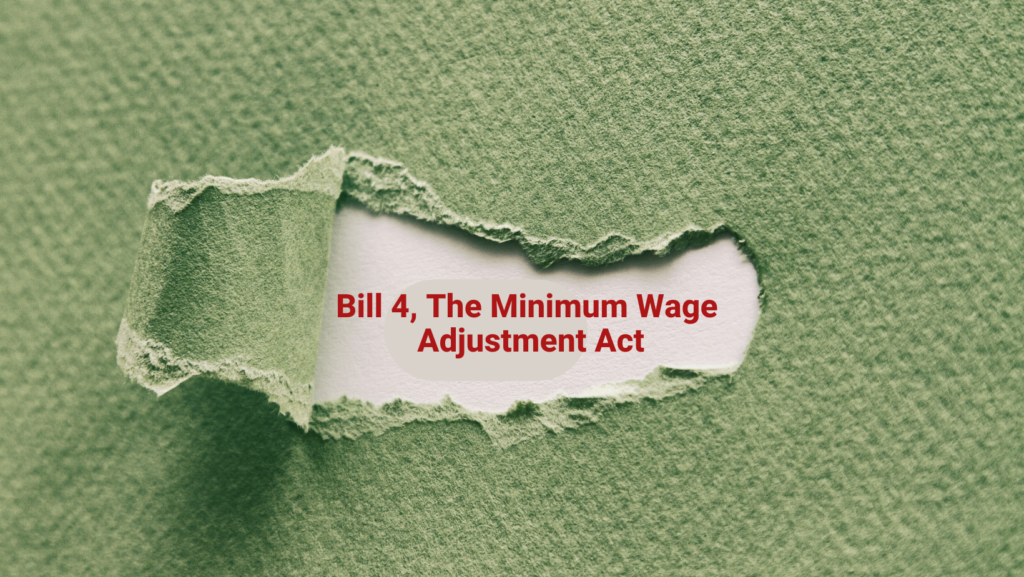Niall Harney’s presentation in response to Bill 4, The Minimum Wage Adjustment Act,
2022.

Bill 4 brings in a welcome boost to the minimum wage during a difficult period for workers in
Manitoba. Increasing the minimum wage to $14.15 per hour on April 1 will certainly help the
thousands of Manitobans working at the minimum wage deal with the sharp increase in the
cost of living experienced across the country over the last eighteen months.
While the minimum wage increase proposed in Bill 4 is a welcome step towards raising the
minimum to $15 per hour in 2023, this bill does not raise the minimum wage sufficiently to
ensure that all Manitoba workers can afford the basic necessities and escape poverty.
The Canadian Centre for Policy Alternatives Manitoba publishes an annual calculation for the
living wage in Manitoba. The living wage is the hourly rate at which a family of four, with two
parents working full time at thirty-five hours per week and two children below age ten, can
meet their basic needs once government transfers have been added to the family’s income
(including the Canada Child Benefit, the GST Credit, Rent Assist, and childcare subsidies) and
deductions have been subtracted (including income taxes, EI premiums, and CPP contributions).
The calculation covers ten categories of household expenses, including food, clothing, shelter,
transportation, child care, health insurance, a small fund for parents’ education, a small
contingency fund to cover illness or job loss, and other household expenses such as a cell
phone, internet, and household supplies. We use local cost of living figures from Winnipeg,
Thompson, and Brandon to calculate the living wage for each of these cities. For a breakdown of
household expenses in each city see the appendix to this presentation.
We calculate that in 2022, the living wage in Winnipeg is $18.34, in Brandon it is $15.66, and in
Thompson it is $16.25. Across the province, the wage that is required to cover the basic costs of
a household, and to ensure that workers and their children are not living in poverty, is above the
proposed minimum wage increases proposed for April 1 and Oct 1 2023. This means that although the minimum wage is set to increase significantly in 2023, many working families in
Manitoba are likely to remain living in poverty.
For a single parent supporting a child here in Winnipeg, the living wage is $25.28 per hour, in
Brandon it is $14.44 per hour, and in Thompson it is $15.77 hour. Given this calculation, it does
not seem possible for a single parent in Winnipeg working full time to make ends meet at the
current minimum wage, or the future minimum.
It is important to emphasize that the living wage merely covers the basic necessities for a
household. A worker earning the living wage likely will not be able to cover items many take for
granted such as credit card, loan, or other debt payments; saving for retirement; owning a
home; saving for a child’s future education; recreation, entertainment, or holiday costs; costs of
caring for a disabled, seriously ill, or elderly family member; or a cushion for emergencies or
tough times.
Full-time work should always provide a decent quality of life for workers in Manitoba and
should be a ladder out of poverty. Bill 4 should be amended to ensure that the minimum wage
is raised to $18.34, in line with the living wage.
Studies from across the country are clear that increases to the minimum wage across North
America do not produce a net reduction in employment. The composition of employment will
shift, however the net boost to incomes and spending that result from increasing the minimum
wage boost economic development.
Further, a society in which all workers can afford at least the basic necessities of life tends to be
healthier. When the minimum wage provides workers with an income that forces sacrifices to
be made between food, shelter, and other basics, these workers and their children take on
greater stress which results in health complications and other social issues. We as a society end
up taking on this cost through higher spending on healthcare, education, and other social
services, effectively subsidizing the social costs of low wage work.
These days, many Manitobans can relate to the frustration of working harder only to fall further
behind. Our research reveals that minimum wage workers in Manitoba are increasingly
educated, established in their jobs, and supporting families. Surviving on the minimum wage
was untenable before the pandemic and is certainly unsustainable now.
Niall Harney, Errol Black Chair in Labour Issues


